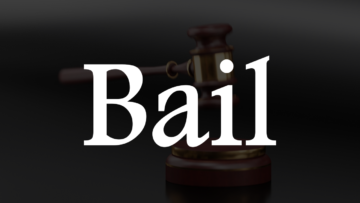Chapter 35 of the Bharatiya Nagarik Suraksha Sanhita (BNSS), 2023 provides for provision regarding bail under sections 478 to 483, which states the cases in which bail shall be granted, the maximum period for which an undertrial prisoner may be detained, when bail can be granted in case of a non-bailable offence, requirement of bail for the accused to appear before the next appellate court, direction for grant of bail to a person apprehending arrest, special powers of the High Court or the Court of Session in respect of bail, etc.
Sections 478 to 483 of Chapter 35 of the Bharatiya Nagarik Suraksha Sanhita (BNSS), 2023:
- Section 478 – In what cases bail to be taken.
- Section 479 – Maximum period for which under-trial prisoner can be detained.
- Section 480 – When bail may be taken in case of non-bailable offence.
- Section 481 – Bail to require accused to appear before next Appellate Court.
- Section 482 – Direction for grant of bail to person apprehending arrest.
- Section 483 – Special powers of High Court or Court of Session regarding bail.

Table of Contents
What is bail?
Bail is a legal mechanism that allows an accused or suspected to be released from custody before or during trial, with certain conditions imposed by a court official to ensure the accused’s presence before the court during the trial or when required. In most cases bail is granted against a surety as it helps to ensure the accused’s presence when required.
Section 2(b) of the Bharatiya Nagarik Suraksha Sanhita (BNSS), 2023 defines the term bail as – “bail means release of a person accused of or suspected of commission of an offence from the custody of law upon certain conditions imposed by an officer or Court on execution by such person of a bond or a bail bond.”
Before granting bail, the court considers some important points so that it does not affect the society and no one’s rights are violated:
- Nature of the offense – What type of crime has the accused committed? Is it serious or minor? Violent or non-violent?
- Criminal history – Has he committed any crime before or not?
- Pending cases – Is there any case pending against him? If yes, then what type of case is it?
- Past behavior on bail – How was his behavior the last time he got bail? Did he violate any rules?
- Flight risk – Is the accused likely to run away?
- Threat to society or witnesses – If he is released, can he harm others?
- Health and personal circumstances – do the accused have any serious health problems, how old he is (e.g., very young or elderly), does he have dependents (e.g., children or a sick family member), etc
If the accused has committed a bailable offence, he has the right to get bail by depositing the bail amount before the police, if he is arrested and taken into custody at the police station or if the accused does not get bail at that time, the accused can obtain bail from the court under the same procedure.
If the accused has committed a non-bailable offence, he can apply for bail in the court under whose jurisdiction he falls, if the court finds a valid reason to release the accused on bail, the court can grant bail with certain conditions and if needed, the court can take bail from the accused along with a witness so that his presence can be maintained before the court.
If someone gets bail and he does not fulfill the conditions under which he has been granted bail, the court can cancel his bail and seize the security given by him and put it in the government account. If someone’s bail is cancelled, an arrest warrant is issued against them, and in this case, it becomes difficult to get bail again. If he applies for restoration of bail with valid reasons before the court, it is possible that the court accepts the application and grants bail to the accused again.
Types of Bail
Following are the types of bail:
| Anticipatory Bail | Bail before arrest. |
| Regular Bail | Bail after arrest. |
| Interim Bail | Bail during pendency of main application. |
| Statutory Bail/Default Bail | Bail if chargesheet is not filed within the statutory time limit (60 – 90 days). |
Anticipatory Bail
Anticipatory bail is a type of bail that is granted by the High Court or Sessions Court when an applicant applies for anticipatory bail due to apprehension of arrest. If the court deems fit, it can grant anticipatory bail to the applicant. The provision regarding anticipatory bail is given under Section 482 of the Bharatiya Nagarik Suraksha Sanhita (BNSS), 2023, which is as follows: –
Direction for grant of bail to person apprehending arrest (Section 482):
- When any person has reason to believe that he may be arrested on an accusation of having committed a non-bailable offence, he may apply to the High Court or the Court of Session for a direction under this section; and that Court may, if it thinks fit, direct that in the event of such arrest, he shall be released on bail.
- When the High Court or the Court of Session makes a direction under sub-section (1), it may include such conditions in such directions in the light of the facts of the particular case, as it may think fit, including—
- a condition that the person shall make himself available for interrogation by a police officer as and when required;
- a condition that the person shall not, directly or indirectly, make any inducement, threat or promise to any person acquainted with the facts of the case so as to dissuade him from disclosing such facts to the Court or to any police officer;
- a condition that the person shall not leave India without the previous permission of the Court;
- such other condition as may be imposed under sub-section (3) of section 480, as if the bail were granted under that section.
- If such person is thereafter arrested without warrant by an officer in charge of a police station on such accusation, and is prepared either at the time of arrest or at any time while in the custody of such officer to give bail, he shall be released on bail; and if a Magistrate taking cognizance of such offence decides that a warrant should be issued in the first instance against that person, he shall issue a bailable warrant in conformity with the direction of the Court under sub-section (1).
- Nothing in this section shall apply to any case involving the arrest of any person on accusation of having committed an offence under section 65 and sub-section (2) of section 70 of the Bharatiya Nyaya Sanhita, 2023.
Regular Bail
Regular bail is the most common type of bail and is granted after the arrest of the accused. If the accused has committed a bailable offence, he is entitled to get bail if he is willing to fulfill the conditions. If the accused has committed a non-bailable offence, he can apply for bail before the court under whose jurisdiction he falls. In non-bailable cases, the court has the discretion whether to grant bail or not.
The provision regarding regular bail is given under Section 480 (Magistrate) and 483 (High Court and Sessions Court) of the Bharatiya Nagarik Suraksha Sanhita (BNSS), 2023, which is as follows: –
Regular Bail by Magistrate
Section 480 of the Bharatiya Nagarik Suraksha Sanhita (BNSS), 2023 empowers a Magistrate to grant regular bail in a non-bailable offence:
When bail may be taken in case of non-bailable offence (Section 480)
- When any person accused of, or suspected of, the commission of any non-bailable offence is arrested or detained without warrant by an officer in charge of a police station or appears or is brought before a Court other than the High Court or Court of Session, he may be released on bail, but—
- such person shall not be so released if there appear reasonable grounds for believing that he has been guilty of an offence punishable with death or imprisonment for life;
- such person shall not be so released if such offence is a cognizable offence and he had been previously convicted of an offence punishable with death, imprisonment for life or imprisonment for seven years or more, or he had been previously convicted on two or more occasions of a cognizable offence punishable with imprisonment for three years or more but less than seven years:
- Provided that the Court may direct that a person referred to in clause (i) or clause (ii) be released on bail if such person is a child or is a woman or is sick or infirm:
Provided further that the Court may also direct that a person referred to in clause (ii) be released on bail if it is satisfied that it is just and proper so to do for any other special reason:
Provided also that the mere fact that an accused person may be required for being identified by witnesses during investigation or for police custody beyond the first fifteen days shall not be sufficient ground for refusing to grant bail if he is otherwise entitled to be released on bail and gives an undertaking that he shall comply with such directions as may be given by the Court:
Provided also that no person shall, if the offence alleged to have been committed by him is punishable with death, imprisonment for life, or imprisonment for seven years or more, be released on bail by the Court under this sub-section without giving an opportunity of hearing to the Public Prosecutor.
2. If it appears to such officer or Court at any stage of the investigation, inquiry or trial, as the case may be, that there are not reasonable grounds for believing that the accused has committed a non-bailable offence, but that there are sufficient grounds for further inquiry into his guilt, the accused shall, subject to the provisions of section 492 and pending such inquiry, be released on bail, or, at the discretion of such officer or Court, on the execution by him of a bond for his appearance as hereinafter provided.
3. When a person accused or suspected of the commission of an offence punishable with imprisonment which may extend to seven years or more or of an offence under Chapter VI, Chapter VII or Chapter XVII of the Bharatiya Nyaya Sanhita, 2023 or abetment of, or conspiracy or attempt to commit, any such offence, is released on bail under sub-section (1), the Court shall impose the conditions,–
- that such person shall attend in accordance with the conditions of the bond executed under this Chapter;
- that such person shall not commit an offence similar to the offence of which he is accused, or suspected, of the commission of which he is suspected; and
- that such person shall not directly or indirectly make any inducement, threat or promise to any person acquainted with the facts of the case so as to dissuade him from disclosing such facts to the Court or to any police officer or tamper with the evidence,
and may also impose, in the interests of justice, such other conditions as it considers necessary.
4. An officer or a Court releasing any person on bail under sub-section (1) or sub-section (2), shall record in writing his or its reasons or special reasons for so doing.
5. Any Court which has released a person on bail under sub-section (1) or sub-section (2), may, if it considers it necessary so to do, direct that such person be arrested and commit him to custody.
6. If, in any case triable by a Magistrate, the trial of a person accused of any non-bailable offence is not concluded within a period of sixty days from the first date fixed for taking evidence in the case, such person shall, if he is in custody during the whole of the said period, be released on bail to the satisfaction of the Magistrate, unless for reasons to be recorded in writing, the Magistrate otherwise directs.
7. If, at any time, after the conclusion of the trial of a person accused of a non-bailable offence and before judgment is delivered, the Court is of opinion that there are reasonable grounds for believing that the accused is not guilty of any such offence, it shall release the accused, if he is in custody, on the execution by him of a bond for his appearance to hear judgment delivered.
Regular bail by the High Court or Sessions Court
Section 483 of the Bharatiya Nagarik Suraksha Sanhita (BNSS), 2023 empowers the High Court or the Sessions Court to grant regular bail in a non-bailable offence:
Special powers of High Court or Court of Session regarding bail (Section 483)
1. A High Court or Court of Session may direct,—
- that any person accused of an offence and in custody be released on bail, and if the offence is of the nature specified in sub-section (3) of section 480, may impose any condition which it considers necessary for the purposes mentioned in that sub-section;
- that any condition imposed by a Magistrate when releasing any person on bail be set aside or modified:
Provided that the High Court or the Court of Session shall, before granting bail to a person who is accused of an offence which is triable exclusively by the Court of Session or which, though not so triable, is punishable with imprisonment for life, give notice of the application for bail to the Public Prosecutor unless it is, for reasons to be recorded in writing, of opinion that it is not practicable to give such notice:
Provided further that the High Court or the Court of Session shall, before granting bail to a person who is accused of an offence triable under section 65 or sub-section (2) of section 70 of the Bharatiya Nyaya Sanhita, 2023, give notice of the application for bail to the Public Prosecutor within a period of fifteen days from the date of receipt of the notice of such application.
2. The presence of the informant or any person authorised by him shall be obligatory at the time of hearing of the application for bail to the person under section 65 or sub-section (2) of section 70 of the Bharatiya Nyaya Sanhita, 2023.
3. A High Court or Court of Session may direct that any person who has been released on bail under this Chapter be arrested and commit him to custody.
Interim Bail
Interim bail is granted when the main application for bail is pending. When the accused files a bail application, he has to file an application for interim bail during the pendency of the application. If the court deems fit, it may allow the interim application. The period of interim bail depends on the nature of the offence and the discretion of the court, and the interim bail expires when the main application is heard.
Statutory Bail/Default Bail
Statutory bail or default bail is a type of bail that is granted by the court if the investigating agency does not file a chargesheet within the prescribed period, which is usually 60 to 90 days, depending on the offence. It is not granted automatically, it requires the accused to file a default bail under Section 187 (3) of the Bharatiya Nagarik Suraksha Sanhita (BNSS), 2023. Note: Default bail is granted only if the accused is still in judicial custody (they are not entitled to get default bail if they are already on bail).
Period for getting default bail:
| Where the investigation relates to an offence punishable with death, imprisonment for life or imprisonment for a term of ten years or more. | 90 days |
| Where the investigation relates to any other offence mentioned above. | 60 days |
187 (3) of the Bharatiya Nagarik Suraksha Sanhita (BNSS), 2023
The Magistrate may authorise the detention of the accused person, beyond the period of fifteen days, if he is satisfied that adequate grounds exist for doing so, but no Magistrate shall authorise the detention of the accused person in custody under this sub-section for a total period exceeding—
- ninety days, where the investigation relates to an offence punishable with death, imprisonment for life or imprisonment for a term of ten years or more;
- sixty days, where the investigation relates to any other offence, and, on the expiry of the said period of ninety days, or sixty days, as the case may be, the accused person shall be released on bail if he is prepared to and does furnish bail, and every person released on bail under this sub-section shall be deemed to be so released under the provisions of Chapter XXXV for the purposes of that Chapter.
Read Also:
FAQ/QNA
Q1. What is bail?
Ans: Bail is a legal mechanism that allows an accused or suspected to be released from custody before or during trial.
Q2. Which section provides the provision regarding anticipatory bail?
Ans: Section 482 of the Bharatiya Nagarik Suraksha Sanhita (BNSS), 2023 provides provisions regarding anticipatory bail.
Q3. In which court is anticipatory bail filed?
Ans: Anticipatory bail is filed in the High Court and Sessions Court.
Q4. When is regular bail granted?
Ans: Regular bail is granted after the arrest of the accused.
Q5. Write types of bail.
Ans: Following are the types of bail:
1. Anticipatory Bail
2. Regular Bail
3. Interim Bail
4. Statutory Bail/Default Bail
Source:













